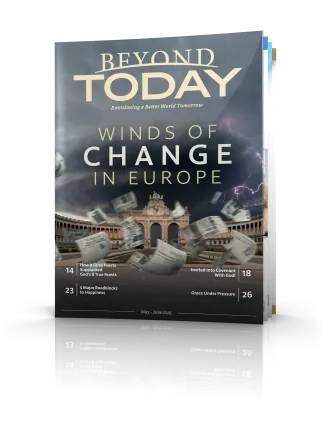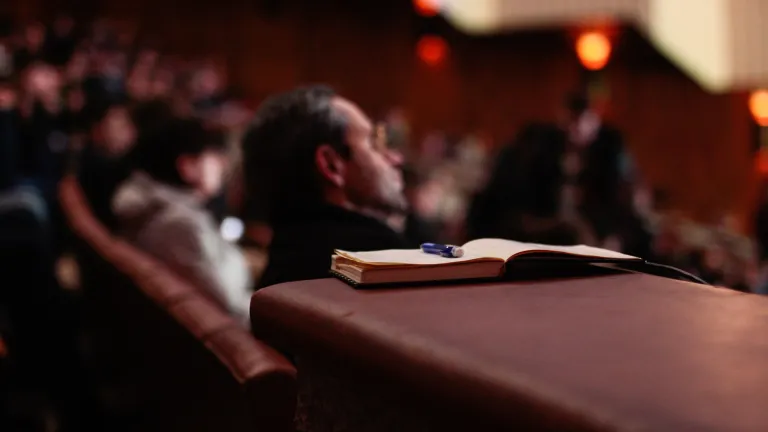How Eight False Feasts Replaced God’s True Biblical Festivals

The Bible lists eight biblical festivals God gave as times of worship for His people. Yet traditional Christianity has rejected all of these and substituted for each one something fraudulent. Will you persist in this with the world at large—or choose what God says to do?
Many would be surprised to learn that just as God reveals eight feasts or festivals He calls “My feasts,” found in both the Old and the New Testament and listed together in full in Leviticus 23, there are also eight main unbiblical feasts that traditional Christianity has effectively established in their stead. Was this replacement legitimate?
The Bible tells us not to adopt false religious practices to worship God in place of what He’s commanded (Deuteronomy 12:29-32). It also tells us not to judge a matter before hearing it (Proverbs 18:13). So let’s briefly consider each of these substitutions to better see which practice is the right one.
1. Sunday for the Sabbath
This first of God’s feasts was to be observed on a weekly basis, while the other seven were annual festivals, occurring just once a year.
Leviticus 23:1-3 mentions about the Sabbath: “And the Lord spoke to Moses, saying, ‘Speak to the children of Israel, and say to them: ‘The feasts of the Lord, which you shall proclaim to be holy convocations, these are My feasts. Six days shall work be done, but the seventh day is a Sabbath of solemn rest, a holy convocation [or commanded assembly]. You shall do no work on it; it is the Sabbath of the Lord in all your dwellings” (emphasis added throughout).
Keeping the seventh-day Sabbath (from Friday sunset until Saturday sunset, as the Bible defines days) had been directly commanded in the Ten Commandments (Exodus 20:8-11). Yet today, many people regard Sunday, the first day of the week, as the day for Christian worship. Astonishing as it may seem, if we look through the entire Bible, we find there is not one example of a man or woman of God who quit keeping the Sabbath day and started observing Sunday instead! In fact, Sunday is never mentioned in Scripture as being a weekly holy day or one of God’s feasts.
Surprisingly, even as late as A.D. 440 a famous Catholic church historian, Socrates Scholasticus, revealed that Christian believers were still assembling on the Sabbath everywhere except in Rome and Alexandria. He states, “For although almost all churches throughout the world celebrate the sacred mysteries on the Sabbath of every week, yet the Christians of Alexandria and at Rome, on account of some ancient tradition, have ceased to do this” (Ecclesiastical History, Book 5, sect. 22). Another Catholic historian of that day, Sozomen, also attested to the same fact.
A major factor that led to the abandonment of Sabbath-keeping in these two cities was a strong anti-Jewish attitude. Yet it was not until the Synod of Laodicea around A.D. 364 that Sabbath-keeping was officially banned among Christians in the Roman Empire.
As a result, history shows it was the Catholic church that imposed its will over the Roman Empire to exclusively observe Sunday instead of the Sabbath. Nonetheless, the Roman church was unable to fully stamp out the Christian Sabbath, which continued to be observed in secret during the vicious religious persecutions. And it continues to thrive even to this day around the world.
Thus, a man-made feast, Sunday, was eventually substituted for a biblically based feast, the Sabbath, that had also been kept by Jesus Christ and His apostles (Luke 4:16; Acts 17:2).
📖 God's Sabbath: Why is this day so important?
2. Good Friday for Passover
The next feast, the first annual one, is listed in Leviticus 23:4-5: “These are the feasts of the Lord, holy convocations [again, commanded gatherings] which you shall proclaim at their appointed times. On the fourteenth day of the first month [on the Hebrew calendar] at twilight is the Lord’s Passover.” This was the day Jesus died, with “Christ, our Passover . . . sacrificed for us” (1 Corinthians 5:7).
The New Testament observance of Passover was later swapped out for a festival that came to be known as “Good Friday” as part of Easter Week.
“The Nicaean Council [in A.D. 325—1,700 years ago],” says the Jewish Voice, “abandoned the Jewish calendar for the Gregorian (the calendar we commonly use today) and declared the resurrection [of Christ] would be celebrated the first Sunday after the new moon following the Spring equinox. It’s unfortunate, to say the least, that this Council went to such great lengths to separate what God designed to coincide. The disassociation of Passover and Good Friday on the calendar has been sadly effective in keeping much of the world from seeing God’s intended connection between Passover and Jesus, between Old and New Covenants” (“Passover and Good Friday Converge,” April 6, 2022).
Consequently, “Good Friday,” part of the Easter celebration that week, took the place of the Christian Passover—so that many Christian believers today memorialize Good Friday while knowing little or nothing about the Passover and its relevance for them.
3. Easter Sunday for the Days of Unleavened Bread
The next of God’s feasts that was changed was the Feast of Unleavened Bread. It says in Leviticus 23:6, “And on the fifteenth day of the same month is the Feast of Unleavened Bread to the Lord; seven days you must eat unleavened bread.”
This was displaced by what became known as Easter Sunday.
As The Encyclopedia Britannica explains: “There is no indication of the observance of the Easter festival in the New Testament, or in the writings of the apostolic Fathers . . . The first Christians continued to observe the Jewish festivals, though in a new spirit, as commemorations of events which those festivals had foreshadowed” (11th ed., p. 828).
The apostle Paul told Christians to keep the Feast of Unleavened Bread (1 Corinthians 5:8). Jesus was raised from the dead during this festival. In context, that was part of leading us out of sin and death and into righteousness—integral to the meaning of the feast. Yet that is all forgotten in the exclusive focus on the supposed resurrection day. And in fact Jesus was not resurrected Sunday morning, as many believe (see our study guides offered below).
Biblical directives have been replaced with a celebration based in pagan traditions focused on sunrise and fertility, with eggs and rabbits.
4. Whitsunday for Pentecost
The next feast that was changed was the biblical Pentecost. Leviticus 23 says, “Count fifty days [from a special offering during the Feast of Unleavened Bread] to the day after the seventh Sabbath; then you shall offer a new grain offering to the Lord . . . And you shall proclaim on the same day that it is a holy convocation to you . . . It shall be a statute forever in all your dwellings throughout your generations” (verses 16, 21). Fifty days here gives us the term Pentecost, derived from the New Testament Greek word for “fiftieth.”
It commemorated the offering of firstfruits of harvest to God and was the day the Christian Church began with the outpouring of the Holy Spirit in Acts 2:1-4, Christians of this age being a kind of “firstfruits” in God’s spiritual harvest of humanity (James 1:18; John 4:35).
With the changed timing of Passover, the 50-day count to Pentecost was also changed. This new festival sometimes coincides with the biblical festival but often doesn’t. In Britain and among some Christian groups in other countries the new observance is called Whitsun or Whit Sunday. The “white” in the name is seen by some as recalling the white garments of people getting baptized in medieval times. But others see the parades and pageants of this occasion as recalling earlier pagan traditions—emerging from a conflation of the Celtic holiday Beltane (May Day) and summer solstice rites of June. “Green week” leading to this Pentecost in Slavic countries is linked to the cult of the dead and spring fertility rites, with focus on birch trees and nature spirits.
As church historian Jesse Hurlbut remarks about the human-instituted feasts of the church in Rome: “The forms and ceremonies of paganism gradually crept into the worship. Some of the old heathen feasts became church festivals with change of name and of worship” (The Story of the Christian Church, 1967, p. 78).
5. Halloween and All Saints’ Day for the Feast of Trumpets
The next biblical feast supplanted was the Feast of Trumpets. Leviticus 23:24 says, “Speak to the children of Israel, saying: ‘In the seventh month, on the first day of the month, you shall have a sabbath-rest, a memorial of blowing of trumpets, a holy convocation.’”
This fall festival in the land of Israel, called the Feast of Trumpets, was eventually substituted by a Catholic festival now celebrated as Halloween.
John Chrysostom, a famous fourth-century Catholic bishop, contemptuously admitted there were Christians still keeping the biblical feasts: “The festivals of the pitiful and miserable Jews are soon to march upon us one after the other and in quick succession: the Feast of Trumpets, the Feast of Tabernacles, the fasts [Day of Atonement]. There are many in our ranks who say they think as we do. Yet some of these are going to observe the festivals and others will join the Jews in keeping their feasts and observing their fasts.
I wish to drive this perverse custom from the Church right now” (Against the Jews, Homily 1, para. 5). He, of course, advocated instead the keeping of Catholic man-made feasts rather than God’s festivals spelled out in the Bible.
The term Halloween is a contraction of “All Hallows’ Evening,” the beginning of All Hallows’ Day or All Saints’ Day, as established by the Catholic Church. A Catholic mass is held in the evening to prepare followers for honoring those who have supposedly gone to heaven. Yet today it’s mostly celebrated in the Western world by children dressing up as witches, goblins and other costumed characters and going “trick or treating.” These elements are well known to have derived from pagan fall festivals.
How was the eve of All Saints’ a substitute for the Feast of Trumpets? The true biblical feast foreshadows the return of Jesus Christ with the blowing of trumpets (Revelation 8-9), culminating with the last trumpet announcing His triumphant coming to the earth and the resurrection of God’s faithful people throughout the ages (Revelation 11:15; 1 Thessalonians 4:16-17).
As Jesus said about His return, “And He will send His angels with a great sound of a trumpet, and they will gather together His elect from the four winds, from one end of heaven to the other” (Matthew 24:31).
Halloween, in contrast, supposedly celebrates the “saints” of the Catholic Church going to heaven—yet for many has returned to its pagan roots in a celebration of the dead as wandering ghosts. Instead of celebrating a pagan holiday of departed souls used to claim saints go to heaven at death, the Feast of Trumpets focuses on the true afterlife in a resurrection from death, when Christ’s followers will reign with Him “on the earth” (Revelation 5:10).
6. All Souls’ Day for the Day of Atonement
The next of God’s feasts pushed aside was the Day of Atonement. Leviticus 23:27 says: “Also the tenth day of this seventh month [of the Hebrew calendar] shall be the Day of Atonement. It shall be a holy convocation for you; you shall afflict your souls [a reference to fasting].”
Among the Jewish people the time from the Feast of Trumpets to Atonement was seen as a judgment period each year that looked ahead to future judgment—with a big focus on atonement or the means of forgiveness of sin. They sadly did not recognize that this day pointed to the atoning work of Christ. It also pointed to the removal of Satan as an instigator of sin.
In the counterfeit festival system, All Saints’ Day is very closely linked with the next day, All Souls’ Day, focused on those who have died, especially those imagined to be still in purgatory, a lesser version of hell that allows purification through punishment. The doctrine on purgatory was established at the Second Council of Lyon in 1274. It states people can pray to the dead saints who can intercede on behalf of those atoning for their sins in purgatory, enabling them to make their way to heaven more quickly.
Note that this Catholic feast deals with the subject of atonement for sins and a person’s final destination, themes central to the biblical Day of Atonement—yet not at all in the same way. The New Testament connects Christ’s atonement for our sins with the biblical Holy Day: “But into the second part the high priest went alone once a year [on the Day of Atonement], not without blood, which he offered for himself and for the people’s sins committed in ignorance . . . And as it is appointed for men to die once, but after this the judgment, so Christ was offered once to bear the sins of many. To those who eagerly wait for Him He will appear a second time, apart from sin, for salvation” (Hebrews 9:7 and Hebrews 9:27-28).
The false teaching of “All Souls’ Day” is based on the unbiblical doctrine of the immortality of the soul and purgatory, vying against the meaning of God’s genuine Day of Atonement, which looks ahead to the removal of sin in the future, at Christ’s return, when Satan is at last removed as the perpetrator of sin and deception (Revelation 20:1-3).
7. Christmas for the Feast of Tabernacles
Next, Leviticus 23:34 says, “Speak to the children of Israel, saying: ‘The fifteenth day of this seventh month shall be the Feast of Tabernacles for seven days to the Lord . . .’” It is to be a time of great rejoicing, giving thanks for all God’s provisions: “. . . and you shall rejoice before the Lord your God for seven days” (Leviticus 23:40; see Deuteronomy 16:15).
The greatest celebration in the mainstream Christian world comes late in the year at the time of Christmas, the supposed observance of Christ’s birth. Yet it has pagan roots, though not often readily admitted. Religious historian Samuele Bacchiocchi remarked: “Do Christian sources openly admit the borrowing of the date of such a pagan festivity? Obviously not. To admit borrowing a pagan festival, even after due re-interpretation of its meaning, would be tantamount to an open betrayal of the faith. This the Fathers [early Catholic writers] were anxious to avoid. Augustine and Leo the Great [famous Catholic leaders], for instance, strongly reprimanded those Christians who at Christmas worshiped the Sun rather than the birth of Christ” (From Sabbath to Sunday, 1977, pp. 257-258).
The Feast of Tabernacles of late fall looks ahead to the time when Christ will rule all nations with His resurrected followers for 1,000 years (see Revelation 20:4-6). Christians who have observed the Feast of Tabernacles with this understanding know how much rejoicing there is, yet with the biblical moderation that is taught in the Scriptures. During that feast there is no pressure to spend into debt exchanging gifts or to use so many pagan-derived decorations, such as Christmas trees, mistletoe and Yule logs.
During Christ’s reign all nations will be taught “to worship the King, the Lord of hosts, and to keep the Feast of Tabernacles” (Zechariah 14:16-19). Christmas, on the other hand, will be no more.
8. New Year’s for the Eighth Day
Lastly, Leviticus 23:36 states, “On the eighth day you shall have a holy convocation, and you shall offer an offering made by fire to the Lord. It is a sacred assembly, and you shall do no customary work on it.” Right after the seven-day Feast of Tabernacles celebration is another feast called “the Eighth Day” (also in Nehemiah 8:18). It’s connected to the prior feast, but its meaning extends beyond.
What substitutes for the Eighth Day, to complete the duplicity of these man-made festivals? The Catholic feast celebrating the New Year, reestablished by Pope Gregory XIII in 1582. It takes place on what many have regarded as the eighth day of Christmas, just as the biblical Eighth Day is a week after the start of the Feast of Tabernacles.
As one writer notes: “The pagans of Rome engaged in debauchery and resolutions for the new year—something modernity has embraced . . . Most of Western society has returned to revelry and resolutions . . . on what is the eighth day of Christmas” (Erick Erickson, “It’s a New Year, but for Many, the Same Problems Still Exist,” Orange County Register, Jan. 7, 2025, p. 11).
Of course, it’s evident that this New Year’s feast of man-made tradition has nothing to do with the biblical feast it replaced. The biblical Eighth Day represents a true new beginning for all who have been duped by the devil into following false worship traditions. (Again, see our study guides below to learn more.)
To sum up, then, just as God established eight holy feasts during the year (the weekly Sabbath and the seven annual festivals), so there are, among the many man-made Catholic feasts, eight in particular across the year that by fraud have drawn focus away from the meaning of the biblical feasts originally taught and practiced by the New Testament Church.
Having seen both sets of festivals, which will you choose to observe?
📖 Learn More About God's Biblical Festivals
False Worship Days Introduced in Ancient Israel
-- Tom Robinson
As recorded in 1 Kings 12:25-33, when the nation of Israel split following the death of Solomon into the northern kingdom of Israel and the southern kingdom of Judah, Jeroboam the son of Nebat became king over the northern tribes. Concerned that regular trips by people from the north to worship at the temple in Jerusalem to the south might shift their allegiance to the southern kingdom, leading to uprising against him, he devised innovations in the national worship system to prevent that.
Part of the change involved setting up golden calves to worship in Dan and Bethel, the extremities of the country, evidently meant to represent the true God who had brought their forefathers out of Egypt (the Hebrew elohim translatable as God as well as gods, plural—as with the golden calf made at Sinai). Jeroboam employed syncretism, a blending of religions, in his new worship system. Yet God considered it the worship of demons (2 Chronicles 11:15; see 1 Corinthians 10:20). The king also appointed his own priesthood, not exclusive to the tribe of Levi per God’s commands.
Furthermore, “Jeroboam ordained a feast on the fifteenth day of the eighth month, like the feast that was in Judah” (1 Kings 12:32). He created a substitute feast in place of the Feast of Tabernacles that was like it. Perhaps he added a 13th month to the calendar in a year that Judah didn’t—to push everything off a month. Whatever the case, this personally devised feast and worship system was a vile affront to God.
For his counterfeit religion, including changing the days of worship, Jeroboam remained infamous, the Bible repeatedly calling him the one “who had made Israel sin” (2 Kings 10:31; 2 Kings 13:6; 2 Kings 14:24). Other Israelite kings are said to have “walked in the ways of Jeroboam” (1 Kings 15:33-34; 1 Kings 16:19). We’re also told that “Jeroboam drove Israel from following the Lord, and made them commit a great sin” (2 Kings 17:21). The nation never turned back from this evil even 200 years later, and God sent national captivity as judgment: “For the children of Israel walked in all the sins of Jeroboam which he did; they did not depart from them, until the Lord removed Israel out of His sight, as He had said by all His servants the prophets” (2 Kings 17:22-23).
Let it never be said that replacing the worship system God gave with some alternative practice is acceptable to Him. As we read in Deuteronomy 12:29-32, we must adopt nothing that originated in false worship, being careful to follow exactly what God says to do.








